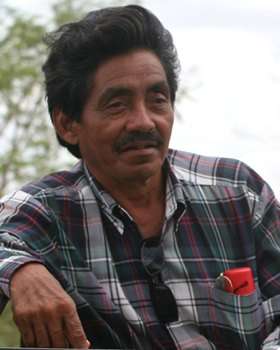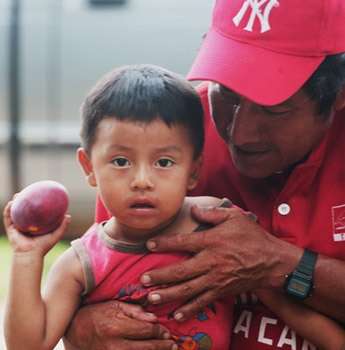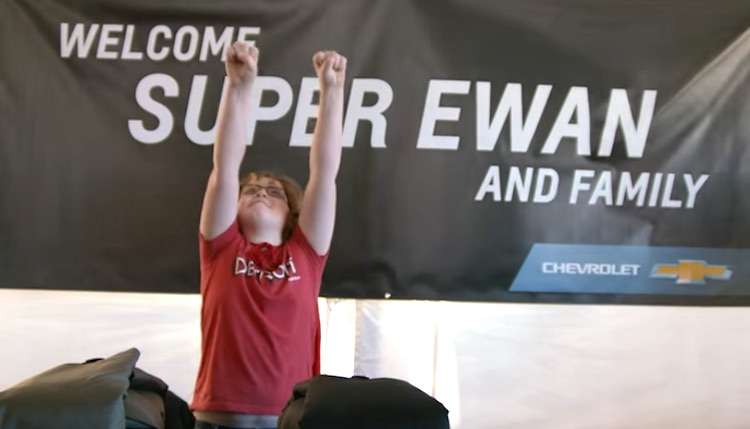Jesus Hernandez Arias lay in the Arizona desert, half-blind and freezing.
Dawn was approaching on March 11, 2006. It was cold –- no more than 45 degrees -– and winds upwards of 35 mph only added to the discomfort brought on by unrepentant rain.
Hernandez, a 43-year-old diabetic, had by now lost almost all feeling in his extremities, and his vision amounted to nothing more than varying shades of black. He worried about his blood glucose level, the possibility of paralysis or death.
Hernandez had crossed the U.S.-Mexico border the night before with 17 others who, like him, could not afford a pollero's guidance.
Most of those in Hernandez's group were crossing for the same reasons: to find work and send money home to impoverished families, to start new lives in the United States or simply rejoin relatives.
Hernandez's reason, however, was different: He was crossing the border so others wouldn't have to.
But altruism cannot dictate the delicate balance of a diabetic's blood sugar.
* * * * * *
Hernandez, divorced and the father of a young daughter, had moved four months earlier to Veracruz, Mexico, where he'd met numerous coffee growers. He was impressed by their work ethic but alarmed by their impoverished living conditions.
This incongruity, Hernandez soon found, was due to the fact that the growers had no local market. Unable to sell locally at a reasonable price and too poor to transport their beans to locations with high coffee demand, the growers had no choice but to sell to coyotes, who bought the harvested beans at low prices and resold them to large coffee companies for exorbitant profits.
This had been going on for decades, and the poorer the growers grew the more insoluble their plight became.
Then, in the 1970s, some of the area's young men began traveling to the United States to work and send money home. Soon, families of those who had found employment on the other side began to enjoy luxuries others could never afford: American-made vehicles, extra bedrooms and glass windows in their homes.
Crossing over became something of a rite of passage as countless young men said goodbye to their families to face the dangers that came with crossing the border illegally: unforgivable terrain, unreliable polleros and an unstable border peppered with drug cartels and American vigilante groups.
Unsettled by the risk he saw young people taking, Hernandez decided the answer was organizing growers so they could start their own coffee cooperative. As their own bosses, he reasoned, growers would enjoy the profits they deserved, their standards of living would rise dramatically and their sons might no longer be tempted to gamble their lives on the border.
Hernandez had training in agronomy, but the growers needed money to organize, and the majority had nothing to spare for the cause. Not even Hernandez, who was living on his savings, could afford to invest in the project.
Determined to pull these growers out of poverty, Hernandez turned his gaze northward. He decided working in El Norte was the best and fastest way to finance the collective.
* * * * * *
Among those in Hernandez's group was Erica, the Venezuelan who claimed to have crossed twice before and –- more or less -– knew the way, as well as a Poblano (originating in the State of Puebla, Mexico.) wearing high-heeled cowboy boots. Hernandez recalled warning the Poblano that he'd never be able to make it out of the desert with such big heels, but the man stood by his choice in footwear.
His group ran across the border at 7 p.m., entering the U.S. Border Patrol's Tucson sector, the harshest in terms of climate and terrain.
They ran all through the night, hoping to find shelter from the weather and a place to hide from Border Patrol agents before daybreak.
It grew cold. Then it began to rain. Then snow.
Hernandez was among the first in his group to react to the elements -– due, perhaps, to his diabetes and the lack of proper food. His black clothes, meant to hide him during the night from Border Patrol agents, were soaked. He began to freeze.
Then, as the small party neared the town of Arivaca, Ariz., Hernandez's vision started failing. Towering cactuses blurred together, small plants disappeared into the trail before him and his companions turned to 17 shuffling specters.
One shadow (he did not know whose) took Hernandez by the hand, guiding him through the desert. Others helped, too.
"This way; that way," they said. "Careful for that; don't trip. There's a bunch of thorns over there –- get to that side."
Somehow he moved on. By 3:30 a.m., as a result of the cold, his high blood sugar or both, Hernandez's arms and legs had grown so numb that he could no longer continue. His body had given up.
As he began to ease himself to the ground, Hernandez saw a shadow approach. It patted him on the back.
"How's it going?" said the shadow. It was the Poblano.
"Very bad. I can't see," said Hernandez. "On top of that, I'm growing cold. I'm freezing."
The Poblano helped him sit down.
"No more. I'm going to stay."
"I can't take it anymore, either," said the Poblano. "You were right about these heels."
He sat down next to Hernandez, and the two waited.
Little by little, in a time span that could have easily been five minutes or five hours, Hernandez lost feeling throughout his body. He slipped in and out of consciousness, catching portions of conversations the Poblano could only have been holding with himself. Conversations about la migra. About going back home. About God.
As the cold took Hernandez, his mind went hundreds of miles south, to his 7-year-old daughter.
* * * * * *
Jesus Hernandez Arias is scarcely more than 5 feet tall. He has brown, somewhat leathery, skin, dark eyes and a thick mustache. He smiles rarely with his mouth -– though often with his eyes. When he does open his mouth, he displays a couple of missing teeth, like many people in rural southern Mexico.
He speaks calmly of crossing to the United States, though with reined emotion, as if retelling a poignant scene from a movie he once saw.
He remembers waking up in a white bed: "I couldn't articulate words. My jaw wouldn't move. I couldn't speak. I could feel nothing. The only thing I could feel was the cold."
Although he did not know it at the time, he had just woken up in St. Mary's Hospital in Tucson, Ariz.
Hernandez didn't remember how he had gotten to the hospital. Had he been picked up by an Arivaca resident or perhaps by a member of a humanitarian organization? Who knows -– it might even have been la migra.
The Poblano was not there with him, although he must have seen to Hernandez long enough to make sure his belongings were safely stored beside his hospital bed. Perhaps it was the Poblano who had carried him to safety.
Within days, Hernandez was contacted by Sarah Roberts, a nurse and No More Deaths volunteer, who took charge of his care after his week-long stay at the hospital. No More Deaths, an organization dedicated to humanitarian aid and civil rights for illegal immigrants, supplying them with water, food and medical assistance. Hernandez decided to volunteer with the group while figured out his next move.
Hernandez joined the co-op, agreeing to return to Mexico to work at the company's coffee roasting and packaging facility in Agua Prieta, the border town facing Douglas, Ariz.
But, as luck would have it, Border Patrol agents pulled over the vehicle in which Hernandez was a passenger heading back to Mexico, and took him into Immigration and Customs Enforcement custody.
Hernandez's experiences in ICE custody and his subsequent deportation only reinforced his resolve to create choices for impoverished Mexican farmers who feel that migrating to the United States is their only option for a better standard of living.
He went to work for Just Coffee at its Agua Prieta and Salvador Urbina locations before returning to help the growers he'd left behind in Veracruz set up their own branch of the co-op.
Then, about a year ago, Hernandez realized that while he was helping dozens of farmers with Just Coffee, he could be helping thousands of impoverished Mexicans under a larger, more organized system.
Today, Hernandez works for AGIRabcd, a nonprofit organization based in France that puts retired workers with specialized skills to work helping others. He promotes agrarian projects and grower-owned commercialization all over Latin America.
He is focusing his efforts in southern Mexico's Campeche countryside, where he is collaborating with local fruit producers and French AGIRabcd volunteers to build a juice manufacturing plant outside of a small town, aptly named Emiliano Zapata.
Hernandez has not lost his quixotic selflessness and does not feel he ever will.
It is that drive that led him to Emiliano Zapata. (In the small town of Emiliano Zapata, farmers struggle to find a viable way to get their fruit to market. Meanwhile, much of it rots on the ground. A plan to build a processing plant may hold the key to their future.)
(Look for PART 2 of this award-winning series "Crossing Lines", tomorrow)
_________________________________________________
Journalism student David Kempa of Arizona State won a 2010 Robert F. Kennedy Journalism Award for a three-part series "Crossing Borders," about immigration issues and one man's mission to help impoverished Mexican farmers.
Kempa won the RFK award in the collegiate category for focusing on "human rights, social justice and the power of individual action in the United States and around the world." The RFK judges, which included Good News Network founder and editor, Geri Weis-Corbley, said, "Illegal immigration is a complicated problem, and Kempa addresses it in a fresh way that contributes to efforts to solve the problem. The reporter found engaging characters and compelling situations. He connected their stories seamlessly, capturing readers' attention on a vital and heart-rending social issue."
The story was originally published by the News21.com program for University journalists, a project funded by the Carnegie Corp. and the Knight Foundation, which includes 12 universities, including the Cronkite School at ASU, which is the national headquarters for the initiative.










Be the first to comment